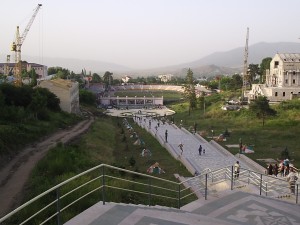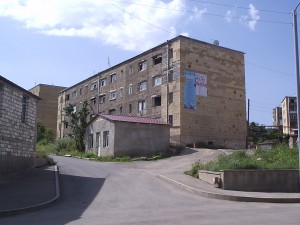(Läsningstid: 9 minuter)‘Curiouser and curiouser!’
I love quests. Otherwise I would have never become a politician. At the same time I never play computer quests, because I am very positive they are quite dull if compared with real political life in contemporary Belarus. Can you get a puzzle to solve just at the very beginning, when you are just registering for the game? Unlikely. In most cases, for introduction you get a long text of the License of Agreement, written in regular Legalese.
Unlike in computer gaming, my quest for becoming a People’s Representative in the City Council started with a whole range of puzzling tasks even before I could get the official registration. When I was registering for candidacy, I was solemnly given a letter from the Tax Inspection office. Why at that very moment? Why only me? Why not via regular mail, but via personal delivery of the Election Commission Chair? The most plausible answer coming to my mind is that the authorities are trying to put pressure on me and the Election Commission members. However, a quest is a quest, so I also sent an official request to the Tax Inspection office and asked them the same questions. They are still keeping silent about their own official motives though. Evidently they are not so experienced in questing…
 Just like Alice in Wonderland, I can only say that subsequent events are getting ‘curiouser and curiouser’. Now, Vitebsk region has the one and only independent newspaper, that of VITEBSKI KURIER (Vitebsk Courier), and the newspaper has never been in favour with the authorities. Actually, we will probably soon have to re-brand it as ‘Vitebsk Phoenix’, because the newspaper team now has a lot of skills in ‘rising from the ashes’ (is there a skill like this in WORLD OF WARCRAFT?). So the authorities never liked the newspaper, but with my registration as a candidate the repressions just rocketed up. The newspaper team has violated no law, from the Election Code or any other, but now it is being considered ‘enemy #1’, and the number of enforcers from the local police who are hunting it down can definitely make a bystander think that the police are dealing with nothing less like Professor Moriarty, Vitebsk City level. Why so? Again, the most plausible answer is that in the official scenario for the coming elections there is no place for independent sources of information. But what can be explanations from the police and the authorities? Anyway, VITEBSKI KURIER will be published and will be delivered to the readers no matter what. Just like before, we will outplay the authorities in this quest as well.
Just like Alice in Wonderland, I can only say that subsequent events are getting ‘curiouser and curiouser’. Now, Vitebsk region has the one and only independent newspaper, that of VITEBSKI KURIER (Vitebsk Courier), and the newspaper has never been in favour with the authorities. Actually, we will probably soon have to re-brand it as ‘Vitebsk Phoenix’, because the newspaper team now has a lot of skills in ‘rising from the ashes’ (is there a skill like this in WORLD OF WARCRAFT?). So the authorities never liked the newspaper, but with my registration as a candidate the repressions just rocketed up. The newspaper team has violated no law, from the Election Code or any other, but now it is being considered ‘enemy #1’, and the number of enforcers from the local police who are hunting it down can definitely make a bystander think that the police are dealing with nothing less like Professor Moriarty, Vitebsk City level. Why so? Again, the most plausible answer is that in the official scenario for the coming elections there is no place for independent sources of information. But what can be explanations from the police and the authorities? Anyway, VITEBSKI KURIER will be published and will be delivered to the readers no matter what. Just like before, we will outplay the authorities in this quest as well.
‘When I use a word,’
Humpty Dumpty said in rather a scornful tone,
‘it means just what I choose it to mean—
neither more nor less.’
Last week the cars my relatives own turned out to be included in the Road Police list of vehicles reported stolen. How come? Another puzzle to solve. Apparently, when enforcers from Vitebsk police see a car, it becomes just what they choose it to become. Humpty Dumpty did the same with words, but never with private property. The culmination of this logic was the case when on April 7 the car officially owned by my husband was arrested and delivered to a Police precinct on the suspicion that it had been stolen. The fact that I myself was sitting in the car and the owner was personally driving it definitely was not enough to clear the suspicion. The sad thing is that while a police platoon was hunting down, arresting, and escorting my husband’s car, some real criminals could be stealing cars at will.
This new type of logic invented by Vitebsk police is sometimes incomprehensible even for their colleagues. When Mogilev Region police officers found a car from the official list of vehicles reported stolen, they also had their piece of quest. They could not figure out why there were 10 000 copies of an officially registered newspaper in there, neatly packed and ready for distribution. They had seen many things in stolen cars, but a complete circulation of a newspaper issue was really something very new. When they called Vitebsk police, Vitebsk enforcers solved their problem immediately. The ‘stolen’ car presented no interest for them, they just asked to confiscate the newspaper copies. Have you already guessed that the newspaper title was VITEBSKI KURIER? If yes, you are also beginning to collect points in this quest.
By the way, the issue reached the readers anyway. The newspaper team fulfilled the civil duty, is spite of the hindrances developed by the authorities and their enforcers. We never forget about our main quest and its mission: to provide people with free unbiased information.
‘Now, I give you fair warning,’
shouted the Red Queen, stamping on the ground as she spoke;
‘either you or your head must be off,
and that in about half no time!
Take your choice!’
Arranging a meeting with my voters was a whole new part of my quest, and there I had to use a lot of my ‘skills and points’. On April 10 my representative sent an official letter to the Administration of Oktiabrski District of Vitebsk notifying them that on April 12-14 I was going to hold meetings with my voters on the territories near their apartment houses. Knowing how ‘creative’ the Red Queen can be in putting obstacles for people who want fair representation, we also sent another copy by registered mail. The royal reaction was fast and furious. The official reply #01-19/19В signed by Mr. V. A. Galanov, the first deputy of the Administration Head, read that ‘… based on the information above, you are not allowed to hold meetings with information and entertainment elements on the territories near the apartment houses of Klinicheski Election District #51… the only place you can use is the open-air scene located at 63-1 Pravdy Street.’
In my election precinct there are a lot of places fully suitable for an open talk with voters. Why didn’t the authorities mention them? Another puzzle… Anyway, I am a law-abiding citizen, so I answered that if it is ‘the open-air scene located at 63-1 Pravdy Street’, let it be so. Let us play there, and let us play fair.
My election precinct is special, because there are four candidates. In most precincts throughout Belarus there is just one. To make the election quest simpler? Well, I and my activists are sure that ‘no selection—no election’. The citizens’ choice must be educated, people must know their candidates, their backgrounds, their programs. The candidates must meet in fair verbal battles, so that people will see who is who now and who is going to be who after the elections. That is why on April 14 I personally called all my rivals and invited them to come to the meeting in the evening to the one and only ‘open-air scene located at 63-1 Pravdy Street’. All the other candidates confirmed receiving the information, and none of them said that they were organizing their own events at the time.
However, the Red Queen had her own views on how candidates must compete for votes. At about 6pm, just one hour before my arranged meeting with voters, I got a call to my mobile phone. A male introduced himself as ‘A. K. Kondratovich, a deputy head of Oktiabrski District Administration’, and then immediately revealed his true nature of being just a playing card in the authority pack. He said that they banned my meeting with voters because another candidate earlier applied for the same place and time, and the candidate does not want my presence there. I felt just like Alice again—I had to be off, and that in about half no time. Needless to say that the candidate was one of those whom I was calling at noon, and he said not a single word about his own ‘planned’ meeting. Had the Red Queen turned him into a zombie? Or was he a zombie from the very beginning?
Continue reading…










